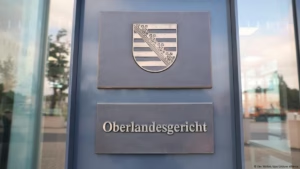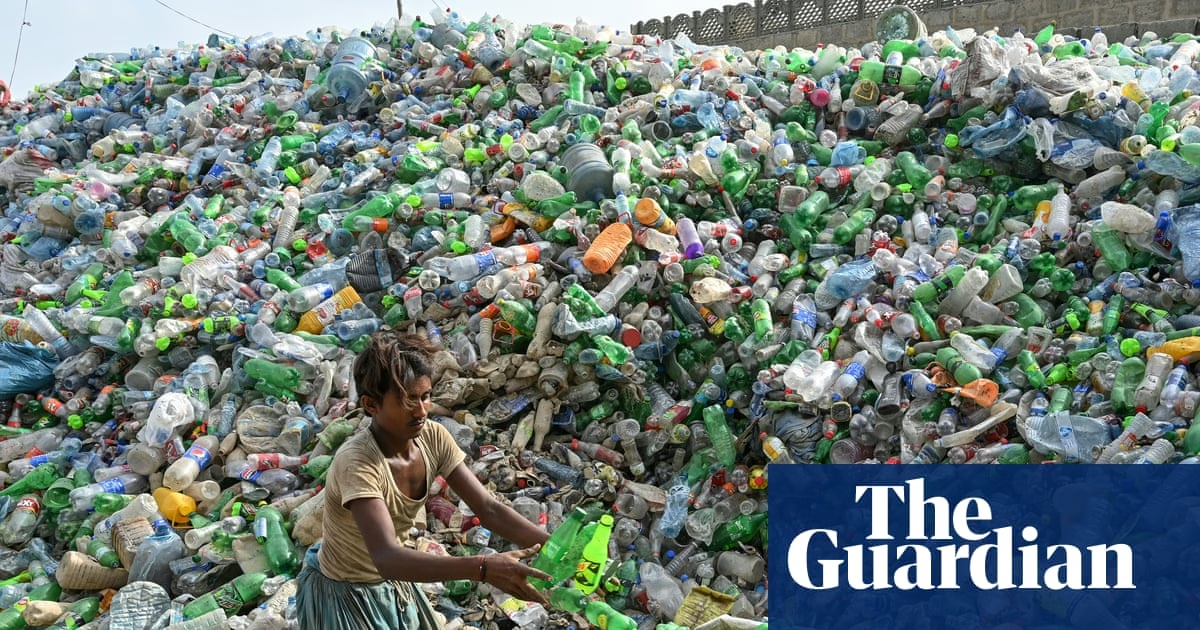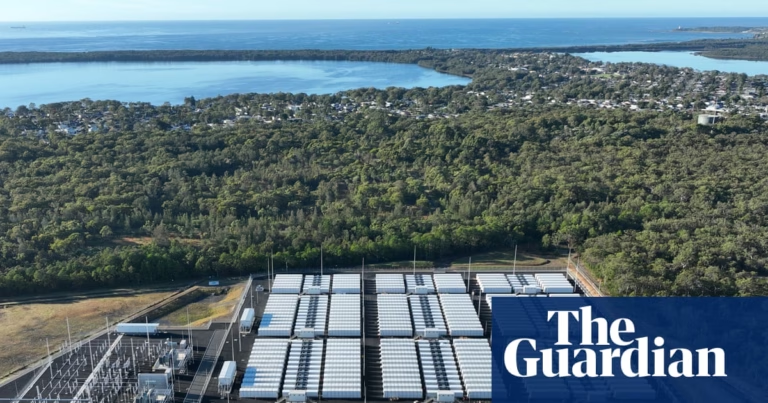Good morning. Not only does plastic waste clog up waterways, beaches, and strangle sea life, but it also causes havoc inside the human body. Tiny fragments – invisible to the human eye – are probably swimming around your lungs, blood, and liver right now.
This represents a “growing and underrecognized danger” to human health, the latest report in the Lancet warns, as 10 days of tense talks kick off in Geneva today, with 179 countries due to hash out a kind of “Paris agreement for plastic pollution”.
These talks – which have been going on since 2022 – have been dogged by deep disagreements. More than 100 nations want a legally binding cap on plastic production, while petrostates want to keep things vague, and maybe promise to, errrrr, do some more recycling, perhaps? It’s possible talks will collapse with no reference to cuts to plastic production.
I spoke to the Guardian’s environment correspondent Sandra Laville about why the sixth (and hopefully final) round of talks are likely to be so fraught and what a good deal could look like.
Five big stories
Weather | Gusts of more than 100mph from Storm Floris have brought travel disruption, power cuts, and the widespread cancellation of events across large parts of the UK. Disruption to the rail network in Scotland is expected until around 4pm on Tuesday, ScotRail has said.
UK news | A member of the House of Lords urged ministers to crack down on Palestine Action at the request of a US defense company that employs him as an adviser. Police are planning to arrest anyone demonstrating in support of Palestine Action this weekend.
Politics | The Conservative leader, Kemi Badenoch, is not telling the truth about the “real failures of 14 years of Conservative government”, the former Conservative prime minister Liz Truss has said.
Tommy Robinson | The far-right activist known as Tommy Robinson has been arrested by British police on suspicion of grievous bodily harm after a man was allegedly assaulted at a London railway station.
Gaza | More than 100 critically ill and injured children in Gaza hope to come to the UK as soon as possible after the government announced a scheme to provide those in severe need with NHS care.
In depth: 10 days, 179 countries and one critical quest to reach a global treaty on plastic
The United Nations agreed to create a treaty on plastic in 2022. Since then, five separate negotiations have failed to secure an agreement. Initially, the idea was for the treaty to address the whole life cycle of plastics, but plans have since been watered down.
The last round of talks – held in Busan, South Korea – broke down at the end of the last year. Country representatives are resuming today for 10 days of talks in Switzerland.
Although plastic is often seen as a cheap material, it’s expensive when you factor in the cost of cleaning up the damage it causes – the latest report found it is responsible for at least $1.5tn (£1.1tn) a year in health-related damages. And almost all plastic is made from fossil oil and gas. Producing all of this plastic results in greater emissions than those produced by Russia – the world’s fourth-largest polluter.
According to the University of Oxford’s Our World in Data, plastic production has increased sharply over the past 70 years. In 1950, the world was producing two million tonnes of plastic to more than 450m tonnes today. Less than 10% of the world’s plastic is recycled, and more than 40% is stuck in landfill.
There were a record 220 fossil fuel and chemical industry lobbyists at the December talks in Busan. That was far more than even the host nation’s delegation of 140 and was three times the number of independent scientists. Hotel and flight costs make the treaty negotiations expensive to attend, which is why rich industrial interests can flood the talks with lobbyists while smaller countries, scientists, and NGOs struggle to find the funds.
Why is this such a pressing problem for human health?
Plastic is, in many ways, a wonder material, but the most rapid increase in production is for single-use plastics, things such as drinks bottles and fast-food packaging, which we sometimes use for a matter of minutes before chucking away. This sort of plastic may be a big earner for companies, but it is not essential for human wellbeing, and the drawbacks are significant.
The latest review, published in the leading medical journal the Lancet, was carried out by leading health researchers and doctors. They found plastics cause disease and death from infancy to old age because they are laced in more than 16,000 chemicals such as fillers, dyes, flame retardants, and stabilisers which have been known to damage human health.
The most vulnerable in society are the most at risk. The analysis found that foetuses and infants were subject to harms such as increased risks of miscarriage, stillbirth, birth defects, impaired lung growth, childhood cancer, and fertility problems later in life.
What are delegates going to achieve?
There are two groups battling it out in Geneva. One is comprised of more than 100 countries – including the EU – which support legally binding global reductions in plastic production and the phasing out of single-use plastic products. The other camp are countries with large fossil fuel industries, such as Saudi Arabia, Russia, and Iran, who say they don’t want any suggestion of tackling plastic production.
The latter group want the agreement to focus on better management and recycling of waste, and for countries to implement voluntary or national measures.
Since 2022, these divisions have become more entrenched. Countries such as Egypt and Malaysia have plastic industry representatives in their national delegations. Meanwhile, the 100 high-ambition countries are not going to fold – the evidence shows we have to reduce plastic production to reduce pollution.
The nature of any agreement is still up in the air – it’s possible a meaningful treaty will be agreed, or they have further meetings, or some countries agree to pursue a “coalition of the willing” treaty outside the UN. Greenpeace is calling for at least a 75% reduction in plastic production by 2040.
But if an agreement can be reached, it would be the equivalent of getting the Paris agreement for climate negotiations. You can argue the Paris agreement hasn’t done much, but there has been an agreement, and we just haven’t had one on plastic pollution. So this is the kind of vacuum that needs to be filled.
What does this say about international environmental diplomacy?
I think there was this real optimism in 2022 when the idea of a treaty was agreed. Scientists were saying that getting a good agreement could be a gamechanger for cutting plastic pollution. But the winds appear to have changed.
The US – which is the world’s second-largest producer of plastic after China – has flip-flopped positions during negotiations, but now appears to be aligned with other major fossil fuel producers and is supporting the least ambitious option. China and Iran are also among the countries looking for less ambition, an option they describe as “realistic”. It comes as the Trump administration in the US rolls back
Source: https://www.theguardian.com/world/2025/aug/05/tuesday-briefing-what-the-final-fraught-talks-to-reach-a-paris-agreement-for-plastic-pollution-could-bring







